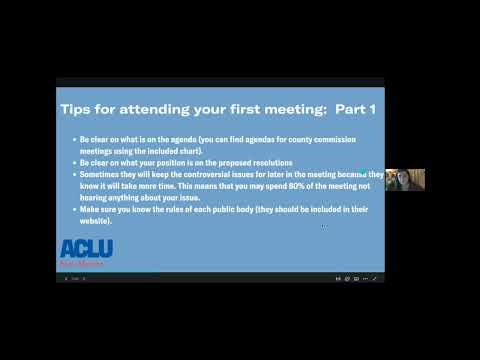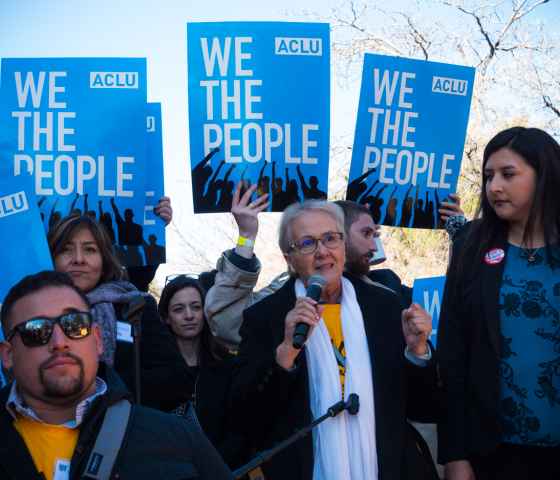The ACLU of New Mexico has created this guide alongside a pre-recorded training to help guide New Mexicans as they begin to track and monitor their local governments. This guide does focus on and uses county commissions as an example for tracking all your local public meetings. This information should be transferred and act as a starting point for whatever local meetings you track. This guide also focuses on tracking local meeting actions on behalf of reproductive health and rights. If there are any further questions about the guide or the training, please contact ACLU-NM for more guidance.
What to monitor:
Public meetings such as county commission meetings, city commissions, city councils, school boards, etc.
What should you watch out for in local public meetings?
- Proposed ordinances: laws or decrees by a municipality that typically forbid or restrict a specific type of activity.
- Resolutions: a statement of policy by the governing body or an order by the governing body that a specific action be taken.
- Expenditures: funds spent or to be spent by the local government.
- Compliance with sunshine laws: laws that promote government transparency to enable residents to hold public bodies accountable.
Note: A resolution generally states a position or policy of a public body and is not legally enforceable. An ordinance is more formal and authoritative than a resolution. An ordinance is a local law that generally regulates persons or property and usually relates to a matter of a general and permanent nature.
Reproductive health things to watch out for:
- Attempts to restrict, ban, or criminalize abortion care (this includes restrictions on where abortions can take place, limits on who can/cannot provide or receive abortion care, complaints against providers, and resolutions declaring localities "unborn sanctuaries").
- Forced parental involvement in young people’s reproductive health care decisions.
- Limits on school-based healthcare centers.
- Anti-trans/LGBTQIA efforts.
- Use of or prohibitions on public funding.
Legal requirements for governmental transparency:
- Open Meetings Act (OMA): States that meetings must be open to the public and a notice that a meeting will take place (the specific requirements vary by a public body). Meeting agendas must be made available at least 72 hours before a meeting. Under certain circumstances, members of the public can sue for OMA violations.
- Inspection of Public Records Act (IPRA): This enables the public to access almost all public records (e.g. police reports, emails to/from public officials, recordings of past meetings or meeting minutes, etc.) with few exceptions. If improperly denied access, members of the public have the right to sue.
Tips for attending your first meeting:
- Be clear on what is on the agenda (you should be able to find or request the agenda on the public body’s website or through email).
- Be clear on your position on the proposed topics of the agenda (ex: resolutions and ordinances).
- Sometimes, they will keep the more controversial issues for later in the meeting since they know these topics will take the most time. That means that, on occasion, you may spend 80% of the meeting not hearing anything about your issue!
- Make sure that you know the rules of each public body (they should be included on their websites).
- Arrive early, if possible; some meetings tend to fill up quickly (especially if an important issue is up for discussion or a vote).
- If you are in a position where you feel unsafe, please document what is happening and remove yourself safely from that situation.
Public Comments:
Each local government has different requirements/steps to take if you are interested in making public comments. The requirements will also be different if you are attending virtually and still wish to make a comment. The best way to find out the rules/how to make a public comment for the specific body is to email or call the contact information listed on their website.
Tips for public comment:
- Prepare a short "elevator speech." This should include your name, your position, why the issue is important to you and your community, and how you would like them to vote. Include any additional information you would like to talk about.
- Use the talking points (if provided)
- Make sure to state that this resolution does not reflect the values of most New Mexicans, including those living in rural areas. The resolutions are unenforceable and do not have the power to stop anyone in Alamogordo from accessing reproductive healthcare.
- Try and avoid stigmatizing language (avoid vocabulary such as hard choice, pro-choice, medically inaccurate information, and more; please refer to the How to Talk About Abortion document that has been shared with you).
Sample public comment:
Below is a sample public comment from Alamogordo's County Commission meeting to pass a Sanctuary for the Unborn Resolution. We are sharing this as a guide for you when you are trying to create your public comment. If you have questions or need help, please do not hesitate to contact [email protected].
Dear Commissioners,
My name is [insert name] I am here today to urge you to vote "NO" on Resolutions 2022-37 to support Otero County's decision and Resolution 2022-38 declaring Alamogordo a "sanctuary city for the unborn."
New Mexico has a proud history of protecting and expanding access to reproductive healthcare, including safe and legal abortion. As a fellow New Mexican, we both know that decisions about reproductive healthcare, including abortion care, are personal and must remain between the person seeking care, their loved ones, and their medical provider.
You must stand in solidarity with your constituents who stand firm in our values of respect and compassion. Again, I urge you to vote "NO" on Resolution 2022-38.
Sample script for calling county commissioners:
Hello, my name is [first and last name].
I am a New Mexico resident calling to urge the county commission to support/not support the proposition [name] that will [talk about the influence in New Mexico].
[Insert why the proposition matters to you, your family, and your community].
I ask the [county commission member or county commission as a whole] to support/not support the proposition.
Thank you for your time.
*If you are ever on the phone with a county commissioner and get a question you cannot answer, tell them that you will find out the information and follow up. You can always ask ACLU-NM staff and we will do our best to help.
What should we do if they do not answer? Leave a message:
If you call a county commission member and do not answer, leave a message stating your name, your stance on the issue, and how you want them to vote.
What to do if the conversation was positive:
If you have a positive conversation with a county commission member, thank them for their time, ask them if they have any questions, and ask them if they will vote yes/publicly support the issue (or no/no support). Make sure you answer any questions that they have, and if you are unsure how to answer their questions, then write them down and follow up with them. It is always a good idea to follow up before a big vote to ensure they are still supporting the issue and check if they have any more questions.
What to do if you have a negative conversation:
If the person you call does not want to speak with you or is rude, then it is essential to note how the conversation went and report back to the organization that has asked you to make calls.
Writing to county commission members: letters and E-mails
Personal letters to county commission members are also effective, but they should always be brief, to the point, and courteous. Because a mailed letter may take a few days to reach your county commission member, it is probably best to email them if an urgent issue/vote is coming up.
Sample E-mail:
Subject: Tell Alamogordo commissioners to vote "NO" on Resolutions 2022-37 and 38
Body: Dear Commissioners,
I write to you today to urge you to vote "NO" on Resolutions 2022-37 to support Otero County's decision and Resolution 2022-38 declaring Alamogordo a "sanctuary city for the unborn."
New Mexico has a proud history of protecting and expanding access to reproductive healthcare, including safe and legal abortion. As a fellow New Mexican, we both know that decisions about reproductive healthcare, including abortion care, are personal and must remain between the person seeking care, their loved ones, and their medical provider.
You must stand in solidarity with your constituents who stand firm in our values of respect and compassion. Again, I urge you to vote "NO" on Resolution 2022-38.
Sincerely, [YOUR NAME]
County Commissions:
Almost all counties in New Mexico have a county commission (not all do); this guide should help you learn how to navigate, track, and make public comments in the county commission meetings.
When you are looking for county commission meeting times, schedule of meetings, and links to the agenda, please refer to the chart. It is important to note that county commission members can declare "emergency meetings" for issues they feel are important. It is a good idea to check the county commission website and meeting schedule once a week. Most county commissions post the schedule of their meetings on the website but not all do.
Almost all county commissions post links to the agendas on their websites. You can use the links in the chart to go directly to the agendas rather than search through their websites. Please check the agendas at least a week before the meeting to see if there is an issue on the agenda that you may care about. We also recommend checking the agenda the day before and during the meeting. If you cannot find an agenda, please email your county commission.
How to join/watch a county commission meeting:
We have included links on the chart for webcasts of some of the county commission meetings if you are interested in attending virtually.
Currently, some county commissions stream their meetings over their website, Zoom, or social media sites such as Facebook. We recommend asking your commission how to watch virtually for more information. If you want to attend a county commission meeting in person, please look at the schedule section on the chart and the website of your commission to see the location of these meetings.
How to be engaged (tips):
- Attend county commission meetings when you can.
- Take notes during commission meetings and report back to the ACLU-NM.
- Check the county commission meeting weekly to see if anything has changed.
- Write, call, or meet with your county commission members to talk about the issues that are most important to you.
- Make sure you use the correct language when discussing your issues to prevent stigma and harm.
- Vote for county commission members representing the issues important to you and your community.
- When a county commission adds something to the agenda that may be concerning, tell your friends, the community, and any organization that works on the issue.
- If you are unsure of something happening or have questions, please contact the ACLU-NM for help.
Volunteer to be a monitor
Let us know you'd be interested in being a monitor for your local governmental bodies by signing up on our volunteer form.
Contact:
Tatiana Prieto, Community Engagement Specialist
E-mail: [email protected]
The information provided in this document does not, and is not intended to, constitute legal advice; instead, all information, content, and materials available here are for general informational purposes only. Information in this document may not constitute the most up-to-date legal or other information. If you are experiencing a specific issue, please contact the ACLU-NM or a lawyer.


